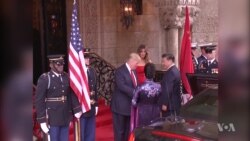When U.S. President Donald Trump makes his first visit to China next week, a key stop on a lengthy trip to the Asian region, trade and North Korea are expected to top his agenda.
Chinese officials have voiced confidence the trip could bring some significant outcomes, but analysts say that may depend largely on Trump’s approach.
Much has changed since President Trump and China’s Xi Jinping met for the first time earlier this year in Florida.
And much hasn’t.
Trade is still a huge issue, but North Korea has rocketed to the forefront of the relationship. And Trump has linked the two together in what one Chinese analyst calls his “unstrategic-strategy.”
That strategy of linking the world’s most complex relationship – ties between the United States and China – with the world’s most difficult problem – North Korea – has yielded some results.
China has approved some of the toughest sanctions to date this year against Pyongyang, as North Korean leader Kim Jong Un has tested the international community’s resolve with provocative missile launches and its sixth nuclear test.
During his visit, Trump will try to press Beijing to do more to sway Pyongyang, but pressure alone is unlikely to sway China. Analysts said that amid the increasingly bellicose rhetoric between the U.S. and North Korea, and Pyongyang’s harsh treatment of Beijing in response to sanctions, China has almost exhausted its options.
Trade concessions as alternative
What Beijing could do, however, is offer something else instead, said Shi Yinhong, a political scientist at Beijing’s Renmin University.
“China could launch some – although limited – but still more substantial trade concessions to Mr. Trump, which will not hurt the Chinese economy and financial [sector],” he said.
Just days before his trip, Trump called America’s deficit with China “embarrassing and horrible.” China quickly responded by saying that it has not intentionally sought a surplus with the United States.
From China’s perspective, Xi will be looking to create a good atmosphere during the brief meetings and show he’s a successful world leader, Shi said.
“Also China wants to persuade Mr. Trump to not launch so much, and so constant military threats of a strike against North Korea. This will backfire and prod Kim Jong Un to further escalate [his] nuclear and missile activities,” he said.
On the streets in Beijing, some expressed concern about North Korea and the threat it poses to China and the region.
“If we can, we should use peaceful means to deal with [Kim Jung Un], but if he insists on antagonizing the world and using force to destroy others, all we can do is use force to destroy him,” said Liu, a financial sector employee interviewed in Beijing.
For most, however, America’s immigration policies under Trump and visas were a bigger concern - one some hope the visit will bring a softening of the U.S. policies as they are perceived by some in China.
“A lot of my classmates who have gone overseas would like to stay in the United States, to either live there or work, but if Trump adopts a more xenophobic policy, it will be more difficult to do that,” said one graduate student, surnamed Zhang.
Another woman surnamed Hao, who works in the financial services sector, said that while news reports have talked about the prospect of worsening economic relations between the two countries, most are concerned about more tangible issues like traveling abroad.
“I think many would like to see further loosening of visa policies, many want to go to the United States, it’s still very attractive,” Hao said.














